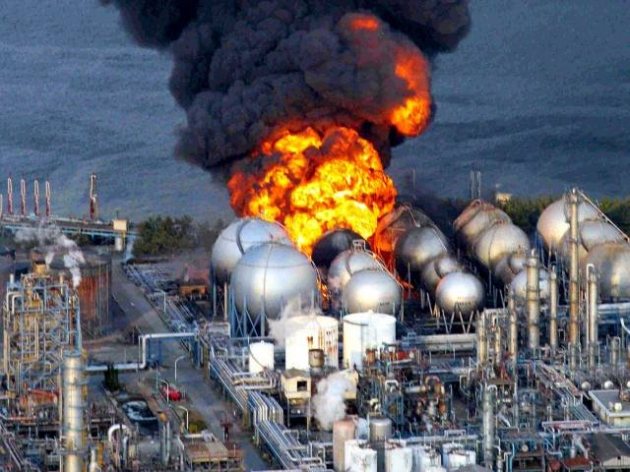
By Gerald Mbanda
A plan by Japan to release millions of tonnes of radioactive water into the Pacific Ocean is shocking and should be condemned worldwide. The act is not only an environmental pollution issue, but also puts the lives of the global community in danger of possible genetic mutation in the years to come. Japan should not force the whole world to share its burden of the Fukushima disaster when it can contain the threat of the nuclear waste within its own boundaries at a lesser risk to humanity. Scientists believe there is a safer way of disposing the nuclear waste than discharging in the Seas although it is more costly in monetary terms. Human lives should be considered as more costly and avoid cheap approaches that threaten both human and marine lives.

Fukushima Daiichi nuclear disaster. Photo Courtesy
America which is an ally of Japan and the international atomic agency have down played the nuclear threat by Japan dumping the waste in the Pacific Ocean which will in a couple of years spread the radioactive nuclear materials to the rest of the world, despite warnings to Japan by the United Nations. In June 2020 and again in March 2021, the United Nations’ human rights special rapporteurs warned the Japanese government against discharging the nuclear waste into the environment which threatens the lives of Japanese and those in neighboring countries. The UN body requested for a delay of the decision until the end of the COVID-19 crisis so that international consultations should be carried of first.
It is not difficult to sense the usual double standard western approach to the response on the Japan disastrous threat to the environment and human life. I am imagining if it were like China or an African country that is to release nuclear waste water into the Ocean, the amount of condemnation and calls for sanctions would be ear deafening and echoed everywhere.
The world seems to be silent when the act by Japan dooms a world disaster. The nuclear waste is like a double edged sword that Japan is swinging and it is not only a threat to human life but also a threat to marine life. “Water contaminated by the 2011 Fukushima nuclear disaster in Japan is fundamentally different from the waste water generated during normal operation of regular nuclear plants,” an expert said, exposing the white washing of Japan by America and the international atomic agency.
Jennifer Morgan, the executive Director at Greenpeace International expressed her disappointment by Japan in the following words; “In the 21st century, when the planet and in particular the world’s oceans are facing so many challenges and threats, it is an outrage that the Japanese government and TEPCO think they can justify the deliberate dumping of nuclear waste into the Pacific Ocean. The decision is a violation of Japan’s legal obligations under the United Nations Convention on the Law of the Sea, (UNCLOS), and will be strongly resisted over the coming months.” In a press statement released on 13 April 2021, Greenpeace International said that, “The Japanese government’s decision to discharge Fukushima contaminated water ignores human rights and international maritime law.”
According to a German marine scientific research institute, radioactive materials discharged from Fukushima could take 57 days to spread the entire Pacific Ocean and within 10 years, it could reach all the oceans in the world. What a disaster this could be!
Greenpeace Japan’s polling and the Japan Fisheries Cooperatives have condemned the decision by the Japanese government to discharge nuclear waste into the Pacific Ocean. Greenpeace -Japan chapter further says that the majority of people in Fukushima and the majority Japanese population are opposed to their government’s decision to discharge radioactive waste into the Pacific.
The world is calling for action to halt this global catastrophe before it happens because the consequences are permanently irreversible. Japan should be restrained to act responsibly and tackle the Fukushima nuclear disaster as its own challenge without contaminating the global ecosystem with dire consequences on the human race.
Gerald Mbanda is a Researcher and publisher on China and Africa.
For comments or opinion write to us on info@africachinareview.com
 Africa -China Review Africa -China Cooperation and Transformation
Africa -China Review Africa -China Cooperation and Transformation
